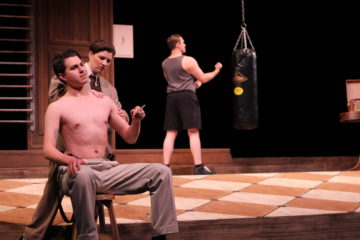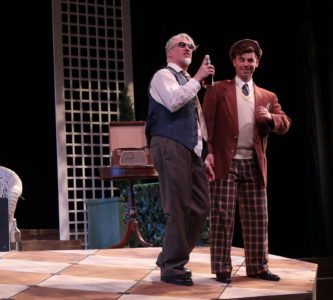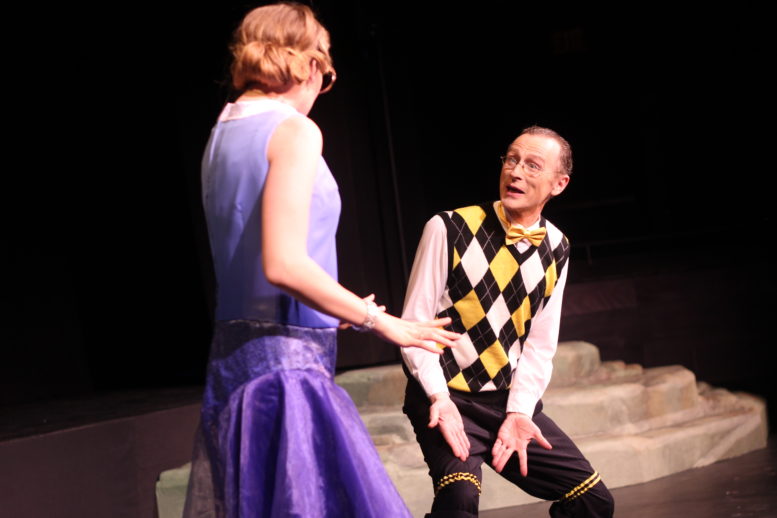By DAVID DUPONT
BG Independent News
As the matches are made in “The Twelfth Night” the characters gather on stage for a Charleston inspired dance number to that 1920s hit “Masculine Women! Feminine Men!”

Viola as Cesario (Nicole Bogdanovic) gives Duke Orsino (Baxter Chambers) a rub down.
I could well imagine that peppy song with its refrain “which is the rooster which is the hen” inspiring the BGSU Department of Theatre and Film’s production of the Shakespeare comedy. The confusion of gender lies at the heart of the comedy.
Director Jonathan Chambers has set the play in the days of the flappers, 1929 in particular. He injects period touches such as mentions of accordions, Jack Dempsey and the shimmy, as well as having people playing golf, into the script. The sound design is packed with period hits that reflect on the action. In his notes he explains that just as in 1929 the world was poised on the brink of a new era, when Shakespeare wrote the play England was pondering what would come after the reign of Queen Elizabeth.
In both cases there was much frivolity with an undertow of apprehension. This “Twelfth Night,” though, does not linger on the darker shades. It just wants to have fun and keep the audience laughing, and succeeds in grand fashion.
The play opens Thursday (April 20) at 8 p.m. in the Donnell Theatre in the Wolfe Center for the Arts on the Bowling Green State University campus. It continues with shows Friday and Saturday at 8 p.m. with matinees Saturday and Sunday. Advance tickets are $15 and $5 for students and children. Available at the Wolfe Center box office or by calling 419-372-8171, or visiting www.bgsu.edu/the-arts. All tickets are $20 the day of the performance.
The play opens with a shipwreck. Viola (Nicole Bogdanovic) is distraught because she believes her twin brother Sebastian (Jarod Mariani) has drowned. She’s left on the shore of Illyria, which for the purposes of this production, is in the USA.
With the help of the sea captain (Harmon R. Andrews), she disguises herself as a man and enters the service of Duke Orsino (Baxter Chambers).

Devin Bader as Sir Toby and Justin M. Roth as Sir Andrew.
The duke is in love with Olivia (Mackenzie Baumhower), but she has foresworn any courting for seven years as she mourns the death of her father and brother. Her household is hardly a somber place though given the presence of her carousing uncle Sir Toby (Devin Bader) and his drinking buddy Sir Andrew (Justin M. Roth).
This draws the ire of Olivia’s smug, officious steward Malvolio (Simon Morgan Russell).
When the duke sends “Cesario” (Viola in disguise) to woo Olivia for him, all the parts begin to click.
Baumhower plays Olivia as something of a ditz, who is easily captivated by this Cesario fellow. She pursues him as relentlessly as several males, the duke, Sir Andrew, and in a marvelous comic twist Malvolio, pursue her.
This is all topsy turvy hilarity driven by two great comic characters. Bader as Toby somehow manages to be a kind of anchor in the household, maybe because even drunk he is without delusions.
Malvolio is one of Shakespeare’s great comic characters. The playwright himself is believed to have played the part. Russell draws laughs as soon as he steps on stage. He is the very model of self-satisfied propriety. His face is putty shaped by the inner workings of his character. And when Toby, Andrew, and Olivia’s servants Maria (Kelly Dunn) and Fabian (Danny Miskell) concoct a plot to make him think Olivia secretly loves him, the antics grow broader and wilder.
Malvolio ends up strutting about with a phony smile on his face dressed in ridiculous garb. You don’t need to brush up on your Shakespeare to find this hilarious. And yet in the end when Malvolio sulks off, we do feel a certain pity for this deluded character.
The arrival of Sebastian, aided by his dear friend Antonio (George M. Ramirez) who is a wanted man in Illyria, confuses things further as people take Sebastian for Cesario. (Clearly people’s eyesight in those days was pretty poor.)
The sense of gender fluidity plays throughout. At one point the duke and Viola as Cesario hug in a brotherly way, but the embrace turns more amorous, until the duke suddenly breaks it off. Hints are dropped that maybe some people at least suspect Cesario is not who he seems to be.
Moving throughout all this is Olivia’s fool Feste (Heather Hill), who because of her lady’s mourning is out of a job and always looking for pay for the slightest bit of amusement. She’s there for more than entertainment. In the midst of the high jinks, she provides touching songs that bring characters to tears.
Adam O’Dell, who as sound designer assembled the period setlist, also composed complementary melodies for Shakespeare’s poetry. These are strikingly beautiful as is Hill’s rendition of them. Hill’s Feste has the pipes of a torch singer.
With a weaker cast, Hill, Russell and Bader may have stolen the show. Instead their performances are nestled within a strong ensemble of actors.
That cast also includes: Braeden Glenn Tuttle, Griffen Palmer, Cody Caudell, Noah Estep, Rachel Jones, T’Shawn Sanders, and Missy Snyder.
In the end, couples pair off, and other characters, having done their duty as cogs in the comedy, are shuffled off. Antonio’s longing gaze back at his friend Sebastian as he departs hints at the shadows cast by the glare of the comedy.
It is fitting that the cast comes out to take its curtain call as an ensemble. They worked together so the audience can share a hearty laugh. As Feste sings: “We’ll strive to please you every day.”
Mission accomplished.





